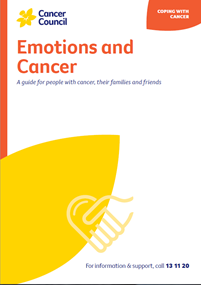- Home
- Cancer Information
- Coping with a diagnosis
- Emotions and cancer
- Getting support
- Health professionals who can help
Health professionals who can help
See the table below for the different health professionals that may be able to help you.
| GP | Your GP can assist you with treatment decisions and works in partnership with your specialists in providing ongoing care. They can refer you to other health professionals for support with managing emotions or thoughts. Check with your GP to see if you can access Medicare rebates for sessions with a psychologist or social worker. |
| cancer care team | The team at your hospital or cancer treatment centre will often include social workers, psychologists, psychiatrists and spiritual care practitioners. If you let your cancer specialist, cancer care coordinator or cancer nurse know how you are feeling, they can arrange for you to see these other health professionals as needed. |
| psycho-oncologist | A psycho-oncologist is a social worker, psychologist or psychiatrist who has specialised in the field of cancer care (oncology). They provide support to people with cancer and their families and carers, and often work in hospitals and cancer treatment centres. |
| counsellor | Counsellors can listen to what is going on in your life and offer strategies for dealing with issues you are facing. They do not need to have any qualifications to practise, although many do, so it’s a good idea to check before making an appointment. Counselling may be available through your local Cancer Council – call 13 11 20 to find out. |
| social worker | Social workers provide emotional support, arrange practical and financial assistance, and help people find support services. They must complete a four-year undergraduate or two-year postgraduate degree. |
| psychologist or clinical psychologist | Psychologists use evidence-based strategies to help you manage emotional conditions, usually in the long term. A registered psychologist must complete four years of psychology at undergraduate level, followed by either postgraduate studies in clinical or health psychology or two years of supervised clinical practice. |
| psychiatrist | A psychiatrist is a trained medical doctor who specialises in the diagnosis, treatment and prevention of mental illness. As well as providing psychological support and discussing issues with patients, a psychiatrist may prescribe medicines to help manage a range of emotional conditions. You need a referral from your GP to see a psychiatrist. |
| mental health nurse | The role of a mental health nurse includes assessing people, giving medicines and assisting in behaviour modification programs. They must be a registered nurse who has completed further study in mental health nursing. |
| spiritual care practitioner | Also known as a pastoral carer, a spiritual care practitioner is often a member of the team at hospitals and cancer treatment centres. They can discuss emotional and spiritual matters and help you reflect on your life and search for meaning. They can also arrange prayer services and other religious rituals, if appropriate. |
| Cancer Council | If you just want to talk through your concerns or you’re not sure where to go for help, you can talk to an experienced health professional at Cancer Council by calling 13 11 20. For more on this see Get support. |
Podcast: Coping with a Cancer Diagnosis
Listen to more of our podcast for people affected by cancer
More resources
A/Prof Anne Burke, Co-Director, Psychology and Allied Health Lead, Cancer, Central Adelaide Local Health Network and The University of Adelaide, SA; Hannah Chen, Psychologist, Cancer Council Queensland; Hazel Everett, Clinical Nurse Consultant, Cancer Services, St John of God Subiaco Hospital, WA; Shona Gates, Senior Social Worker, North West Cancer Centre, TAS; Dr Jemma Gilchrist, Senior Clinical Psychologist, Mind My Health and Crown Princess Mary Cancer Centre, Westmead, NSW; Sandra Hodge, Consumer; Dr Michael Murphy, Psychiatrist and Clinician Researcher, Prince of Wales Hospital, NSW; Caitriona Nienaber, 13 11 20 Consultant, Cancer Council WA; Dr Alesha Thai, Medical Oncologist, Peter MacCallum Cancer Centre, VIC; Alan White, Consumer.
View the Cancer Council NSW editorial policy.
View all publications or call 13 11 20 for free printed copies.
Need to talk?
Support services
Online Community
Check out this supportive online community for people affected by cancer
Need legal and financial assistance?
Pro bono services, financial and legal assistance, and no interest loans
Cancer information
Cancer, work and you
Learn how to cope with the impact that cancer may have on your work life
View our publications
Guides and fact sheets for people with cancer, their families and friends


